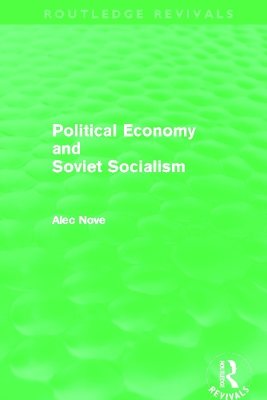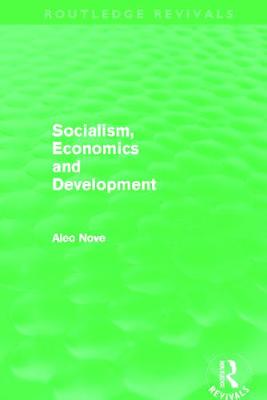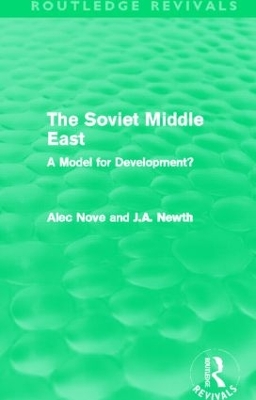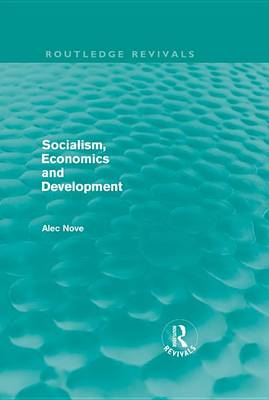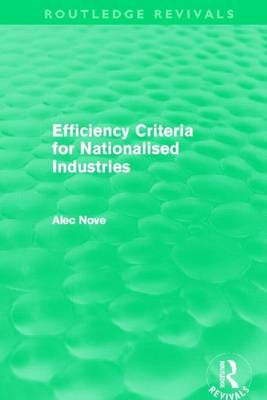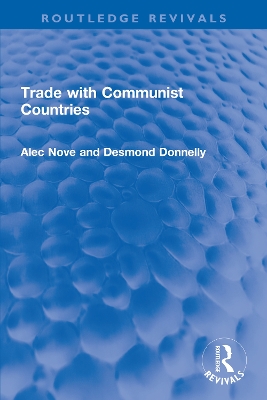Routledge Revivals
12 total works
First published in 1961, The Soviet Economy is a well informed work which seeks to acquaint students with the structure and problems of the economy of the USSR. In a balanced and perceptive analysis, Alexander Nove describes the organisation of economic life and of the planning system, analysing the practical and theoretical problems within the institutional structure of the Soviet system, and introducing the student to Soviet economic ideas and concepts. The subject is then related to the growth of the Soviet economy and to the extent to which both the institutions and the problems reflect the historical peculiarities of the USSR. The author does not try to argue for or against the system or to provide answers but aims to stimulate the reader to enquire further into the more important questions raised by the strengths and weaknesses of the Soviet economy.
Political Economy and Soviet Socialism discusses the ideas of some of the leaders of the Russian revolution (Lenin, Trotsky and Bukharin), the political economy of socialism and the problems of the contemporary USSR.
First published in 1973, Efficiency Criteria for Nationalised Industries asks by what criteria we should judge the efficiency of nationalised industries, what we mean by saying they should be run commercially and where the public interest should lie. In this work, Professor Nove believes we answer these questions incorrectly due to a lack of understanding of economic theory and a desire to relate real world economics to that of the text book. The author says many economists, in a world of indivisibilities, complementarities and systems, persist in thinking in terms of one-dimensional, fragmented marginalism. Professor Nove, who is known for his writings on the Soviet economy, raises many points relevant to the East as well as the West. His work contributes to the economics of socialism, while also making the case for greater realism in economic theory in general.
First published in 1964, Was Stalin Really Necessary? is a thought-provoking work which deals with many aspects of the Soviet political economy, planning problems and statistics. Professor Nove starts with an attempt to evaluate the rationality of Stalinism and discusses the possible political consequences of the search for greater economic efficiency, which is followed by a controversial discussion of Kremlinology. The author goes on to analyse the situation of the peasants as reflected in literary journals, then looks at industrial and agricultural problems. There are elaborate statistical surveys of occupational patterns and the purchasing power of wages, followed by an examination of the irrational statistical reflection of irrational economic decisions. Professor Nove's essay on social welfare was, unlike some of his other work, used in the Soviet press as evidence against over-enthusiastic cold-warriors, among whom the author was not always popular. Finally, the author seeks to generalise about the evolution of world communism.
First published in 1986, this text brings together a selection of papers written by the great Alec Nove on development economics, Marxist economies, the Soviet economy, and Law and Politics in the Soviet Union. Reflecting the varied and diverse interests of its distinguished author, the topics range from Soviet Constitutional Law, to Trotsky’s view of Collectivization; from a critique of conventional micro-economics, to the economic disaster of the Allende regime in Chile.
The author’s long-standing immersion in the past and present of the Soviet Union helps to provide the unique insights into the workings of Socialist economies characteristic of Professor Nove’s previous work. This volume should be essential reading for anyone interested in development economics, socialist economies, or the problems facing contemporary Soviet economic reformers.
First published in 1967, The Soviet Middle East provides an analysis of the economic and political status of the national republics of Central Asia and Transcaucasia, which were, at the time of the book’s initial publication, a part of the Soviet Union.
The authors analyse their economic achievements, as well as their rapid progress in health and education, comparing their situation with that of their non-Soviet neighbours and indeed with the rest of the USSR. They seek to define the relevance of the Soviet planning system and Soviet ideology to the development of these countries, and also to contextualise their study in terms of the problems of other developing countries and the political stability of the Soviet Union as a multi-nation state.
Written by two leading authorities on the Soviet Union, this reissue will be welcomed by students of Soviet and Middle-Eastern history, and by all those interested in the political, social and economic development of Communist republics.
Efficiency Criteria for Nationalised Industries (Routledge Revivals)
by Alec Nove
From the early 1960s until his death in 1994, Alec Nove was one of the world's leading authorities on Russian and Soviet economic history. This Routledge Revivals collection brings together six of his most essential books on the Soviet Economy, taken from across the full breadth of his eminent career.
Written between 1961 and 1989, this definitive collection covers Soviet economic history from the height of the Cold War through to the cultural renaissance of Glasnost in the late 1980s. From Joseph Stalin through to Mikhail Gorbachev, via an exploration of Soviet political economy, efficiency, Socialism and development, this is a truly wide-ranging reissued collection, which will be a delight to Soviet economists and historians.
First published in 1960 Trade with Communist Countries presents an important research report for the first time covering the essential facts and drawing conclusions on East/West trading possibilities. Two authors combine to ensure an authoritative coverage of the many facets of this complex problem. Alec Nove examines the organisation of Soviet trade against the background of domestic economic planning and assesses the prospects for greater East/West trade. In course of his review he discusses such important questions as rates of exchange, bilateralism, and strategic controls. Desmond Donnelly surveys the prospects and practical methods of trading with Communist countries and examines the political consequences of freer trading relations between capitalist and Communist countries. Rich in archival resources this book is a must read for scholars and researchers of economics, economic history, Soviet history, and international trade.

